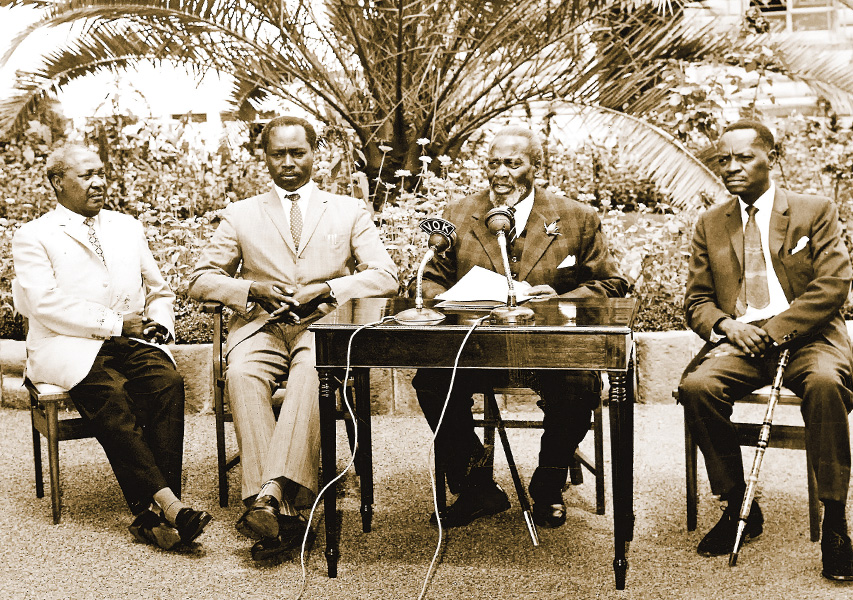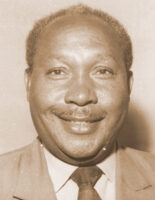
Peter Mbiyu Koinange, the long-standing confidant and bosom buddy of founding President Jomo Kenyatta, served under his successor President Daniel arap Moi for a very fleeting, and what may well be described as lonely, stint.
Used to literally being the President’s right hand man and constant companion, in the Moi administration Koinange found himself in the wilderness, with a Head of State who did not want him anywhere near the Office of the President, let alone in the President’s presence. In fact, when Moi formed his first Cabinet the year following Kenyatta’s death, he abolished the Minister of State docket, which Koinange had monopolised.
Though known to be a member of the ‘Kitchen Cabinet’ opposed to Moi’s ascent to the presidency upon Kenyatta’s death, Koinange had no active role in the 1976 ‘Change the Constitution’ lobby. This was, however, typical of him; he rarely made media pronouncements, preferring to display his authority subliminally through his ubiquitous appearances in public with Kenyatta.
Moi nonetheless consigned Kenyatta’s friend to the unfamiliar jungle of the Ministry of Natural Resources. For a man whose typical haunt had been the presidential lounge at State House, tipping the old man on political affairs and where necessary offering a word of advice, the idea of sitting in the top office of some ministry and actually giving direction must have been scary. For the short stint Koinange headed the Natural Resources docket, nothing much in terms of policy was heard from him.
As if that was not enough punishment, in the 1979 General Election (the first under Moi) Mbiyu lost his Kiambaa parliamentary seat to Njenga Karume, the powerful chairman of the Gikuyu, Embu and Meru Association (GEMA). During the campaigns, Mbiyu found himself on unfamiliar ground campaigning against both Karume and a man who was hitherto his friend, Peter Gachathi, the Permanent Secretary in the Ministry of Education. Koinange never lost a parliamentary battle while Kenyatta was alive, and a disparaging rumour doing the rounds at that time had it that Kenyatta’s single vote was enough to see him sail through at the polls.
The 1979 defeat saw Koinange retire from Government and active politics and settle down to the quiet life of farming and business, far away from the centre of power and the public eye. Then sometime in 1980 he resurfaced in the newspapers when he was appointed to chair the Kenya Salt Manufacturers’ Company until his sudden death the following year. Koinange’s death was unexpected since he was only in his early seventies and widely considered to be in good health. Just two weeks before his death he had attended a fundraiser presided over by Moi in Gatundu during which he was photographed laughing with members of Kenyatta’s family.
Born in 1907, Koinange was among the first batch of students of the highly reputed Alliance High School at its inception in 1926. In 1938 he went on to become the first Kenyan to obtain a Master of Arts degree. His father, Senior Chief Koinange wa Mbiyu, had sent him to the United States in 1927 to complete his secondary school education and enrol for higher education, making him the first Kenyan to be educated in America. Having also studied in Europe for many years, he was a man of uncommon academic and social credentials.
Koinange first attended Hampton College in West Virginia and later Ohio Wesleyan University, where he graduated with a Bachelor of Arts degree. He then studied for a postgraduate degree at the University of Columbia. On his return to Kenya, he partnered with his father to establish the Kenya Teachers’ College in Githunguri, Kiambu District, the cornerstone of independent schools in colonial Kenya. These were focal institutions in the struggle for independence. Koinange was the principal of the college between 1938 and 1947.
Kenyatta and Koinange met in England for the first time in 1936 when Koinange was on a scholarship at Cambridge arranged by Canon Harry Leakey, grandfather of conservationist Richard Leakey. Kenyatta was in London as a student and a representative of the Kikuyu Central Association (KCA), whose demands he had presented before the Colonial Office. The two remained in touch when the younger man left the United Kingdom. It is as a result of the bond they forged in these early years that Koinange would later become Kenyatta’s constant and trusted companion throughout the latter’s presidency, earning himself the nickname Kissinger after American Secretary of State Henry Kissinger.
In 1947, Koinange handed over the college in Githunguri to Kenyatta so he could enrol at the University of London for a diploma from its Institute of Education, and later at the prestigious London School of Economics for further postgraduate studies.
It was many years before Koinange was able to return to Kenya due to the Mau Mau war and the declaration of the State of Emergency in 1952. His father and a host of relatives were caught in the crossfire between the Mau Mau and the colonial government. Many were either detained or restricted.
While in England, Koinange represented the Kenya African Union (KAU) in Europe from 1951 to 1959. He was also involved in Pan-African meetings and demonstrations. He became acquainted with the Gold Coast’s Kwame Nkrumah and when the West African country became independent in 1957 adopting the name Ghana, Nkrumah appointed him Director of the new Bureau of African Affairs in Accra. He held this post between 1959 and 1961.
During his years in the United Kingdom, Koinange was also in touch with other key supporters of Pan-Africanism, such as Nnamdi Azikiwe of Nigeria, George Padmore of Trinidad and Fenner Brockway, the British politician and anti-war activist. Secret material released recently by the British security service known as MI5 (Military Intelligence Section 5) show that Mbiyu received so many letters from all over the world, including Kenya, that it is not clear how he was able to cope with the volumes in a non-electronic age. But this emphasizes the impressive global network of political leaders, trade unionists and NGOs that Koinange interacted with.
They included the International Friendship League, National Council for Civil Liberties, Kenya Taxi Drivers’ Union, Kikuyu Highlands Ex-Squatters Landowners’ Association, Somali National League and United Somali Association. Others were the Fabian Colonial Bureau and the Fabian Society, Indian Peasants’ Institute, Zanzibar African Union, Socialist Youth Union, World Federation of Trade Unions and the Japan Petroleum Workers’ Union. They mainly wrote to support the cause of Mau Mau. Many more letters came from colleagues, family and friends in Kenya.
Jaramogi Oginga Odinga, who was considered the doyen of Opposition politics, invited Koinange for the first Lancaster House Constitutional Conference in London in 1960. Koinange returned to Kenya in 1961, was elected MP for Kiambaa in 1963 and subsequently Kenyatta appointed him to the first Cabinet as the Minister for Pan-African Affairs. He worked briefly in the Education docket and was moved to the President’s Office as the Minister of State in charge of Provincial Administration in 1966, where he worked until Kenyatta died in 1978.
When he came back from Lancaster, many thought the much more educated, thoroughbred and well-connected son of a colonial senior chief would take up the country’s leadership at independence. But Koinange felt (as did KANU head James Gichuru) that Kenyatta had better leadership qualities.
Upon establishment of the new nation, so close were Koinange and Kenyatta that they jokingly called each other korobi (the quarrelsome one). Many have intimated that Koinange was the real ‘power behind the throne’ and that when Kenyatta was angry, only he and First Lady Mama Ngina Kenyatta could face the older man. Mzee’s temper was legendary. But Geoffrey Kariithi, the second Government officer to head the Civil Service in Kenyatta’s administration, reportedly dismissed the view that Koinange was Kenyatta’s co-President, saying they were only bosom buddies. He reported that at times Kenyatta kept his friend at a distance on official matters and that Koinange would occasionally be asked to leave the room as the President consulted technocrats in Government.
Koinange was a cautious politician who barely campaigned and was suspected of neglecting his political and personal responsibilities. His life revolved around Kenyatta, and the closeness between the two was said to have been at the expense of his family and constituents. His wives and children rarely saw him; when they did, it was at State Houses in Nairobi, Mombasa or Nakuru, by appointment, and then for only a few minutes. They often had to find out from the newspapers where the President would be and travel there to meet their husband and father.
Family events such as the weddings of his children, as well as household bills, school fees, visits to the children in boarding school and replies to private mail were left to his secretary, Carmen Pereira, to take care of. His children’s school fees receipts, report forms and personal letters were reportedly often mixed with Government documents in his office drawers.
Koinange’s proximity to the seat of power gave him the courage to get away with inexcusable actions. In 1975 he declined to honour a summons from an official committee investigating the death of popular Nyandarua MP Josiah Mwangi (J.M.) Kariuki. Elijah Mwangale, who was a Cabinet Minister in the Moi era, chaired the committee. Moi, who at the time was Vice President, and Attorney General Charles Njonjo submitted themselves for questioning but Koinange did not even acknowledge the letter asking him to present himself. Later, when asked to appear before the committee to respond to allegations made against him by others, he did not even send an apology.
Years later, one of his wives would tell a reporter that Koinange had declined to honour the summons as the “… people had already made up their minds and only a few would believe whatever he said”. She added that he refused to apologise to the committee as that would have meant he was “afraid of them”. The word fear was not in his vocabulary.
When the report was presented to Kenyatta allegedly with reference to Koinange, the President asked the committee to “correct” it where it had mentioned the Minister, saying that naming Koinange was “tantamount to naming me” (Kenyatta). The committee chairman is said to have erased Koinange’s name on the spot.
One weekend in August 1978, while he and Kenyatta were on a working holiday in Mombasa, Koinange asked for some time off, promising that he would be back the following day. Kenyatta died that night. Koinange received the most shocking telephone call of his life from Coast Provincial Commissioner Eliud Mahihu at 4 am. His bosom buddy had breathed his last.
For Koinange, the world literally came to an end. According to people who knew him well, the man who spoke in a high-pitched voice appeared to have lost the will to live. He became increasingly withdrawn and depressed, and died at the age of 74 in September 1981, three years after his friend Kenyatta’s death.
